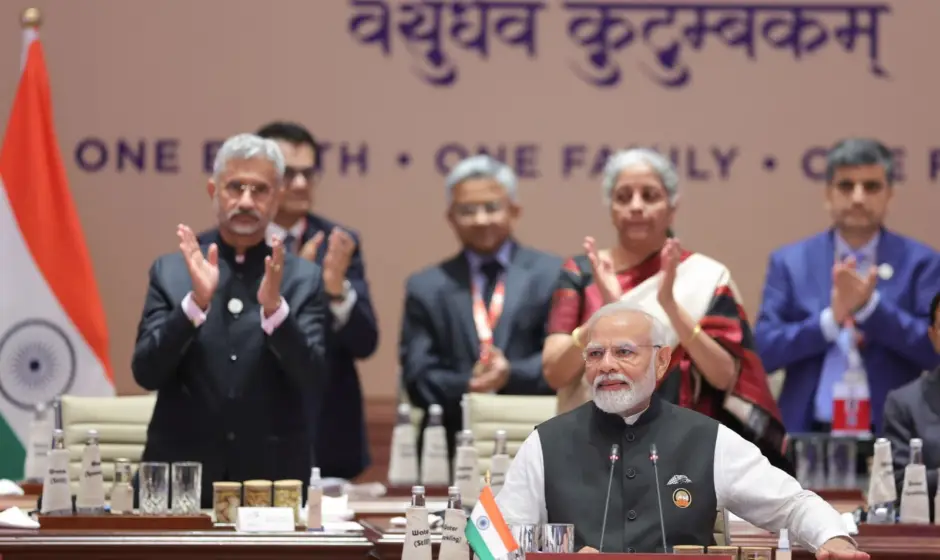Bharat’s allies and foes may have to reconcile to freedom of choice exercised by New Delhi for global good and humanitarian push
K.A.Badarinath
‘Strategic autonomy’ has been at the core of foreign policy doctrine pursued assiduously by Bharat’s government with both friends and foes alike.

India’s foreign minister Subramanyam Jaishankar described this as ‘freedom of choice’ which Bharat exercised time and again to signal that it was above narrow partisan political blocks. These blocks only led to destabilization and restlessness globally.
Some analysts viewed this as polite rebuff to US Ambassador to India Eric Micharel Garcetti who trashed ‘strategic autonomy’ stance of Bharat following Prime Minister Narendra Modi’s visit to Moscow and meetings he held with Russian President Vladmir Putin. Eric Garcetti erroneously claimed that had there was nothing like strategic autonomy during a war in obvious reference to conflict between Russia and Ukraine.
Garcetti, a democratic politician, considered close to President Joe Biden and former Los Angeles Mayor, has not been known as an all-weather friend that India looked for. Garcetti’s nomination to the key position was delayed as confirmations did not come by from the Senate Selections Committee. Garcetti was finally confirmed to India in a split verdict of 52 – 42 votes on March 15, 2023.
India’s foreign office rebuff was important given that Garcetti was personal choice of President Biden for the posting in New Delhi notwithstanding the host’s reservations.
Bharat also pushed back US Under Secretary of State for South and Central Asia Donald Lu who aired his disappointments and purported ‘tough conversations’ that Washington DC had with New Delhi on Prime Minister Modi’s engagements in Moscow.
These ‘blips’ or ‘aberrations’ between two strategic partners could have been easily avoided only if Washington DC appreciated the logic, reasoning and rationale in New Delhi engaging with President Putin at bilateral and personal level.
Subramanyam Jaishankar thoughtfully used his visits to Japan and Laos to drive home the point on ‘strategic autonomy’ that Bharat has carefully crafted in a multi-polar world balancing out compulsions of energy resources management and strategic positioning by India.
For last two-odd years, Bharat had exercised utmost caution while taking her stand on Russia – Ukraine conflict or Hamas invasion of Israel last October 7 forcing the latter to reportedly assassinate Hamas political chief Ismail Hanieh in Tehran.
While West Asia and Eastern Europe is simmering in a crucible with US and European allies taking a unilateral, Bharat continued to be the only major power that pursued a saner line. Bharat has had rejected all forms of terrorism and violation of basic rights for people in each of these countries.
Significant message that Bharat has for global leaders and communities through her independence doctrine is that there was space for dialogue, reconciliation and living together sans bloody conflicts that continue to linger.
Bharat’s allies in US across Democrats and Republican parties will have to appreciate, respect and allow for soft manoeuvring by New Delhi treading her own path. White House under Democratic Presidential nominee Kamala Harris or Republican supremo Donald J Trump will have recognize that views of strategic allies like Bharat will have to be respected rather than sparring in public with imbecile or immature public display of ‘one-upman-ship’.
Multilateral powerful groups like Quad or BRICS should serve as forums for respectful and equitable engagement between equitable partners rather than expecting subservience that’s symptomatic manifestation of a unipolar supremacist mind-set that doesn’t fit into present day matrix.
Bharat’s strategic autonomy exercised with responsibility to protect her interests is known to leaders in Washington DC, newly elected Labour leader Keir Starmer in UK or freshly anointed Heads in European capitals.
Bharat’s allies should not underestimate the long swift swirl of Red dragon in Beijing that may attempt an iron grip for China and Communist Party of China in global affairs.
(Author is Director & Chief Executive at CIHS)

